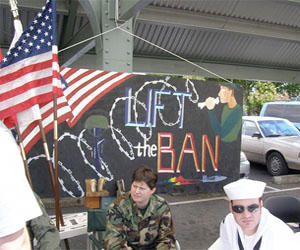Today, the military. Tomorrow, the gameday beer commercials. Michael Jensen of the gay blog After Elton drew our attention to this new Budweiser ad, which hits all the usual signposts—America-lovin’, soldier-celebratin’, barn parties, checked tablecloths, frosty brews—but adds an ambiguous chemistry between the homeward-bound overseas vet and his guy friend. Says Jensen:
So the first person our soldier calls is this other guy. Let’s call him PB for Potential Boyfriend. Clearly the soldier isn’t married or in a serious relationship with the girl we later see him hugging. Otherwise he surely would’ve called her first. So the possibilities are that either that PB is a best friend or … a boyfriend. Hmm, would a soldier coming home really call his best friend before his parents?
If PB is his brother, the brother clearly doesn’t live at home as we see the soldier also call his parents, while PB is driving away from his house to start getting the party ready. And PB sure seems to be much of the focus of the commercial as he prepares for the party. And then who is the first person to greet and hug our soldier? It’s PB of course. And it’s a fairly intense hug.
So is the commercially intentionally gay or not? Well, only Budweiser knows for sure, but if you substituted a woman for PB, it would read pretty much exactly like a heterosexual relationship. And while it’s possible that an ad could inadvertently ready gay, Budweiser has a pretty slick advertising arm so that at least seems somewhat unlikely.
A spirited comment debate thus ensued on After Elton, as well as Bilerico. What do you think? Check out the video below and give us your opinion. I tend to agree with Jensen: Budweiser doesn’t launch an ad without a lot of corporate handwringing, so the ambiguities—and their multiple readings—are likely intentional. But there’s a more important point here.
As we’ve reported before, aside from a couple of outspoken right-wing haters, the country’s shown a fairly rapid move to (finally) extend equal rights to gays and lesbians. Even the hidebound armed services have gotten into the spirit, putting the final nails in Don’t Ask, Don’t Tell’s coffin. But, frankly, when we can posit even the ambiguous possibility of a gay-soldier relationship as a selling-point for domestic beer in the corporate-sponsored interlude between possessions in a Bears-Packers game, we’ve turned a corner culturally (and economically).
Having said that, though, I’m not sure it’s going to help Budweiser sales with the gays. You’d like to think most people, regardless of their orientation, would opt for a beer that doesn’t taste like chilled Clydesdale sweat.












